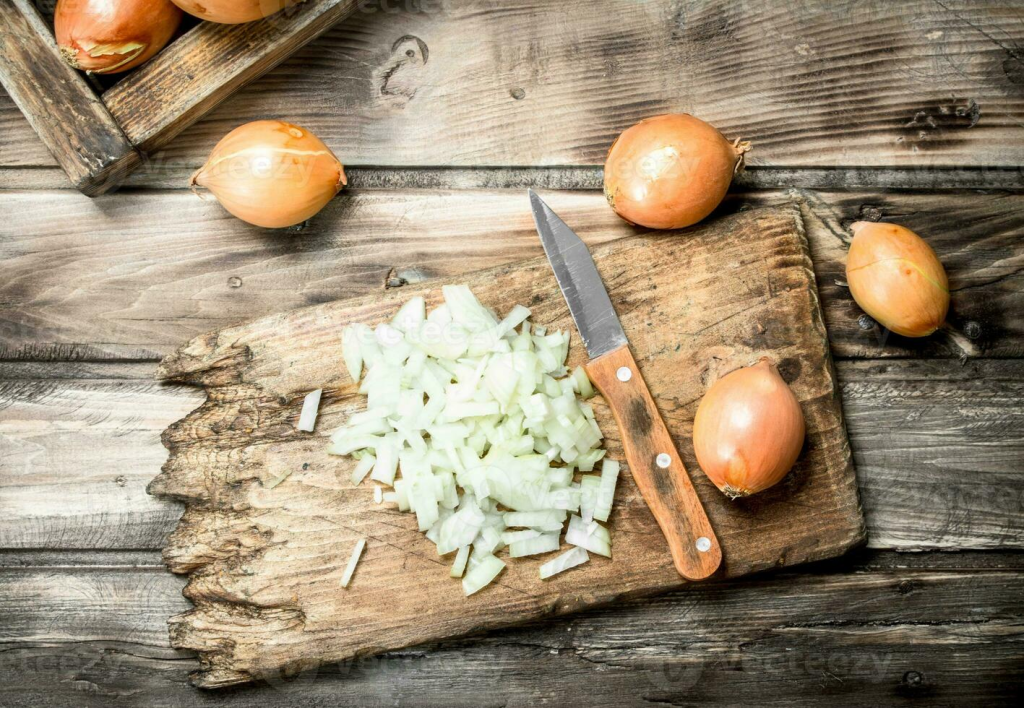In every kitchen, the battle between convenience and flavor is an ongoing debate. One of the most common questions home cooks face is whether to use fresh onions or their frozen counterparts. While some swear by the strong aroma and crisp texture of freshly chopped onions, others prioritize the ease of frozen, pre-chopped options.
So, which one is better? The answer depends on your cooking style, time constraints, and the dish you’re preparing. Let’s break down the pros and cons of fresh vs. frozen onions so you can make the best choice for your meals.
The Case for Fresh Onions: Bold Flavor and Crisp Texture

1. Fresh Onions Provide Superior Taste
When it comes to flavor, fresh onions take the lead. Cutting into a raw onion releases a pungent aroma, thanks to the sulfur compounds that give onions their signature taste. This sharpness adds depth to dishes like salsas, salads, and sandwiches.
If you’re making a dish where the onion’s flavor is front and center—think caramelized onions, stir-fries, or French onion soup—fresh onions will always deliver a stronger, richer taste.
2. Crisp Texture Makes a Difference
Fresh onions offer a satisfying crunch that frozen onions simply can’t match. If you’re using onions in raw dishes like guacamole, burgers, or coleslaw, fresh onions add the perfect bite.
Frozen onions, on the other hand, lose their crispness due to the freezing process. They tend to be softer and slightly watery when thawed, which makes them less ideal for dishes where texture matters.
3. More Control Over Preparation
Using fresh onions gives you full control over how they’re prepared. You can dice, slice, or chop them to your preferred size. With frozen onions, you’re limited to whatever pre-cut size the manufacturer provides, which may not be ideal for all recipes.
The Convenience of Frozen Onions: Saving Time in the Kitchen
4. No Peeling or Chopping Required
Let’s face it—chopping onions can be a hassle. The strong smell lingers on your hands, and the fumes can make your eyes water. Frozen onions eliminate this problem. They’re already peeled, chopped, and ready to use straight from the freezer.
For busy cooks or those who dislike chopping, frozen onions are a game-changer. They cut down prep time significantly, making weeknight cooking faster and easier.
5. Longer Shelf Life, Less Waste
Fresh onions don’t last forever. If not stored properly, they can sprout, soften, or go bad before you get the chance to use them.
Frozen onions, however, have a much longer shelf life. You can keep them in the freezer for months without worrying about spoilage. This makes them a great option for people who cook infrequently or want to reduce food waste.
6. Ideal for Soups, Stews, and Slow-Cooked Dishes

When onions are cooked down in soups, stews, and casseroles, the texture difference between fresh and frozen becomes less noticeable. Since frozen onions are slightly softer, they blend seamlessly into these types of dishes without affecting the final result.
If your recipe requires onions to be cooked for an extended period, frozen onions can do the job just as well as fresh ones—without the extra prep work.
Do Fresh and Frozen Onions Have the Same Nutritional Value?
Many people wonder if frozen onions lose nutrients during the freezing process. The good news? The nutritional differences are minimal.
Onions—whether fresh or frozen—are naturally low in calories and rich in antioxidants, vitamin C, and fiber. While freezing may cause a slight decrease in some nutrients, the overall health benefits remain intact.
So if you’re choosing frozen onions purely for convenience, you’re not sacrificing much in terms of nutrition.
When to Use Fresh Onions vs. Frozen Onions
Still unsure when to use fresh or frozen onions? Here’s a simple guide:
- Use fresh onions for:
- Raw dishes (salads, salsas, sandwiches)
- Recipes where texture matters (caramelized onions, fajitas, burger toppings)
- Dishes that require precise slicing or dicing (stir-fries, onion rings)
- Use frozen onions for:
- Slow-cooked meals (soups, stews, chili)
- Quick weeknight meals (pasta sauces, casseroles, scrambled eggs)
- Reducing prep time and food waste
Finding a Middle Ground: The Best of Both Worlds

If you like the flavor of fresh onions but want the convenience of frozen, why not compromise? Many home cooks chop fresh onions in bulk and freeze them in portioned bags. This way, you get the best of both worlds—better flavor than store-bought frozen onions, but without the daily prep work.
Simply dice the onions, spread them out on a baking sheet to freeze individually, then store them in airtight bags. This method keeps them from clumping together and makes it easy to grab just what you need for cooking.
Final Thoughts: Which Onion Wins?
At the end of the day, the choice between fresh and frozen onions depends on what’s most important to you. If you prioritize flavor, crispness, and control over preparation, fresh onions are the way to go. But if you value convenience, time savings, and reducing food waste, frozen onions are a smart choice.
For most home cooks, keeping both fresh and frozen onions on hand offers the best flexibility. Whether you’re whipping up a quick dinner or preparing a gourmet meal, knowing when to use each type of onion can help you cook smarter and more efficiently.
So next time you’re in the kitchen, consider your recipe and cooking goals—then grab the right onion for the job!


